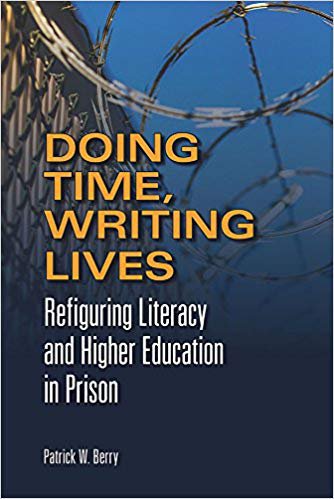Doing Time, Writing Lives
Patrick W. Berry's book highlights potential for incarcerated people to understand themselves

While teaching a college writing course at a prison, Patrick W. Berry asked his students to imagine where they’d be in 10 years and write about that vision. “It was a remarkable experience to watch the students write themselves into a new being,” he says. One of the men at the medium security facility broke out in tears writing about reconciling with his young son. “Watching how the other men responded to him, I saw this kind of community building,” Berry recalls. “It felt beautiful and very moving. It showed the potential of what could happen when they could write through their histories and try to understand themselves in new ways.”
Berry, assistant professor and chair of the writing and rhetoric program in the College of Arts and Sciences, makes the case for college-in-prison programs in “Doing Time, Writing Lives” (Southern Illinois University Press, 2017). The book draws on his two-year experience teaching writing classes and leading writing workshops at a Midwest prison. He is donating proceeds to Project Justice, the college-in-prison program with which he worked. (The program’s name, as well as those of inmates Berry describes in his book, are pseudonyms to protect people’s privacy.)
“For those seeking to better understand what literacy and education can do in the prison context, ‘Doing Time, Writing Lives’ is a must-read,” says a New York Journal of Books review. “Berry's perspective, that of the boots-on-the-ground prison educator, combined with his refusal to focus on what we already know (education reduces recidivism), makes this a uniquely valuable addition to the scholarship on prison education.”

Berry warns against romanticizing literacy in prisons because “such narratives can overshadow the everyday realities.” He notes an overemphasis on the value of literacy in reducing recidivism and helping former prisoners gain employment. “Literacy skills alone do not reverse the discriminatory employment practices many formerly incarcerated people confront on a regular basis,” he told Insider Higher Ed.
In describing prison education, Berry talks about “the contextual now”—a focus on the moment rather than on some future goal. “What about the person who is never getting out? What about the value in the here and now?” he asks. “It’s about holding on to the present. It might be fleeting, but there’s a value in this experience in the moment.”
The concept also applies to college, where “what is happening in the classroom right now does not always fit into neat assessments,” he adds.
When asked their names, some of the men responded with their ID numbers. “Their identity becomes so attached to the prison,” Berry says. “Through literacy and writing, people come to see themselves differently in the prison setting.”
Education in prison “feels like an ethical imperative,” he says. “They are serving their time. If we believe in the rehabilitative potential of education, we have to honor the work that happens day to day because it may lead to good outcomes.”
The book also focuses on instructors in prison literacy programs, often viewed as activists. “The teachers benefited so much from their experience,” Berry says. “They often reported this was the best teaching experience they ever had.” The students “were so deeply interested in what they were teaching,” he explains. “Suddenly their disciplinary expertise was elevated to the importance that drew them to the work in the first place.”
Berry’s prison work spurred memories of his father, who spent most of his adult life in prison. In a moving preface, Berry details his evolving understanding of the challenges his father faced and the toll of incarceration on his family. Berry includes the reflection because “he and many others who find themselves in prison are often erased from our everyday lives,” he writes in the preface.
